Rafaela, Manuela and Maria take a selfie near the Weiming Lake of Peking University in Beijing, capital of China, March 31, 2023.
Maria Eduarda Variani, Rafaela Viana dos Santos, Manuela Boiteux Pestana, and Marco Andre Rocha Germano are Brazilian students studying in the Master of China Studies program at the Yenching Academy of Peking University in China.
The four of them have been interested in Chinese culture since they were young. After arriving in Beijing, they have been impressed by the Chinese capital’s profound cultural heritage, convenient public services, and fabulous cityscape.
While making Chinese friends and learning about Chinese culture, they also participate in intercultural exchanges with other international students.
“Studying at Peking University gives me the chance to have a deeper understanding of Chinese history, tradition, and living customs,” said Manuela.
In the view of the four Brazilian students, China and Brazil have much in common. For example, both are major developing countries rich in natural resources and cultural heritage.
Additionally, both countries attach great importance to education, culture, and economic development. According to them, they all want to make contributions to the development of China-Brazil relations after they graduate. (Xinhua/Ren Chao)
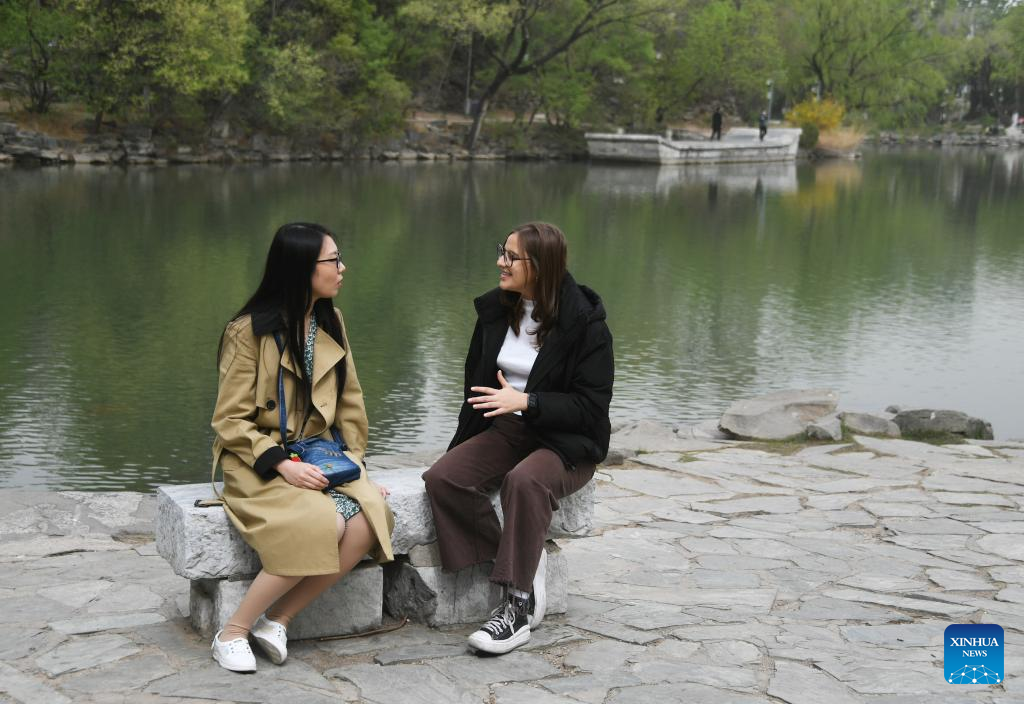
Maria (R) chats with her language partner Yin Yue, a student majoring in Teaching Chinese as a Second Language, at Peking University in Beijing, capital of China, April 13, 2023.
Maria Eduarda Variani, Rafaela Viana dos Santos, Manuela Boiteux Pestana, and Marco Andre Rocha Germano are Brazilian students studying in the Master of China Studies program at the Yenching Academy of Peking University in China.
The four of them have been interested in Chinese culture since they were young. After arriving in Beijing, they have been impressed by the Chinese capital’s profound cultural heritage, convenient public services, and fabulous cityscape.
While making Chinese friends and learning about Chinese culture, they also participate in intercultural exchanges with other international students.
“Studying at Peking University gives me the chance to have a deeper understanding of Chinese history, tradition, and living customs,” said Manuela.
In the view of the four Brazilian students, China and Brazil have much in common. For example, both are major developing countries rich in natural resources and cultural heritage.
Additionally, both countries attach great importance to education, culture, and economic development. According to them, they all want to make contributions to the development of China-Brazil relations after they graduate. (Xinhua/Liu Lingyi)
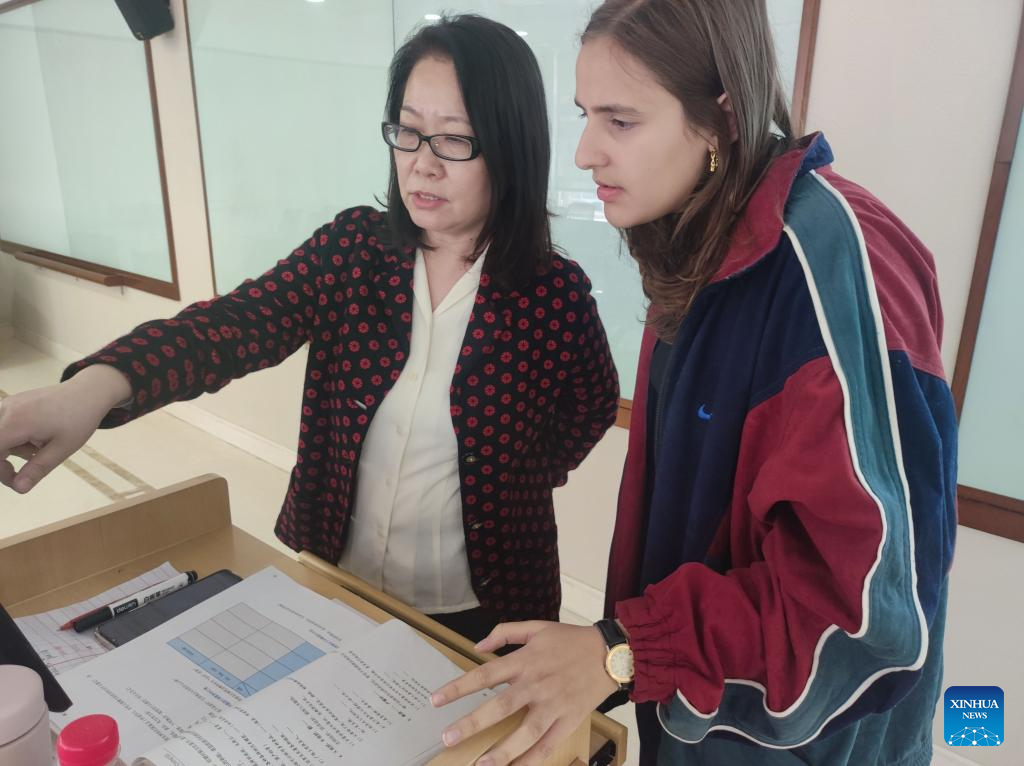
This photo taken with a mobile phone on March 31, 2023 shows Maria (R) talking with an instructor after a Chinese class at Peking University in Beijing, capital of China.
Maria Eduarda Variani, Rafaela Viana dos Santos, Manuela Boiteux Pestana, and Marco Andre Rocha Germano are Brazilian students studying in the Master of China Studies program at the Yenching Academy of Peking University in China.
The four of them have been interested in Chinese culture since they were young. After arriving in Beijing, they have been impressed by the Chinese capital’s profound cultural heritage, convenient public services, and fabulous cityscape.
While making Chinese friends and learning about Chinese culture, they also participate in intercultural exchanges with other international students.
“Studying at Peking University gives me the chance to have a deeper understanding of Chinese history, tradition, and living customs,” said Manuela.
In the view of the four Brazilian students, China and Brazil have much in common. For example, both are major developing countries rich in natural resources and cultural heritage.
Additionally, both countries attach great importance to education, culture, and economic development. According to them, they all want to make contributions to the development of China-Brazil relations after they graduate. (Xinhua)
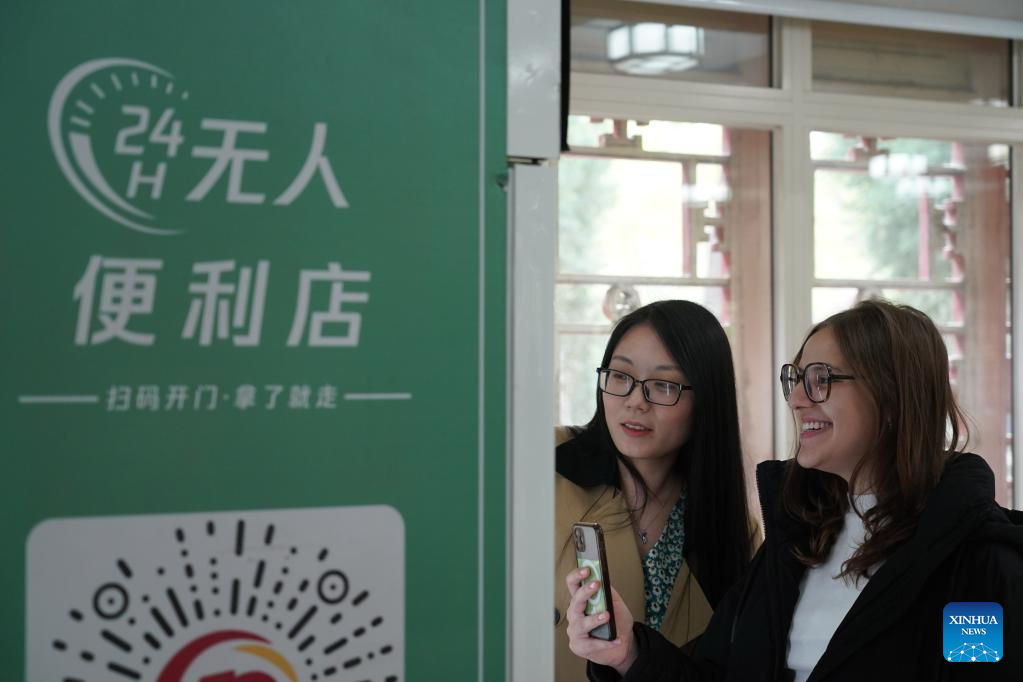
Maria (R) scans a QR code on a vending machine at the Yenching Academy of Peking University in Beijing, capital of China, April 13, 2023.
Maria Eduarda Variani, Rafaela Viana dos Santos, Manuela Boiteux Pestana, and Marco Andre Rocha Germano are Brazilian students studying in the Master of China Studies program at the Yenching Academy of Peking University in China.
The four of them have been interested in Chinese culture since they were young. After arriving in Beijing, they have been impressed by the Chinese capital’s profound cultural heritage, convenient public services, and fabulous cityscape.
While making Chinese friends and learning about Chinese culture, they also participate in intercultural exchanges with other international students.
“Studying at Peking University gives me the chance to have a deeper understanding of Chinese history, tradition, and living customs,” said Manuela.
In the view of the four Brazilian students, China and Brazil have much in common. For example, both are major developing countries rich in natural resources and cultural heritage.
Additionally, both countries attach great importance to education, culture, and economic development. According to them, they all want to make contributions to the development of China-Brazil relations after they graduate. (Xinhua/Ren Chao)
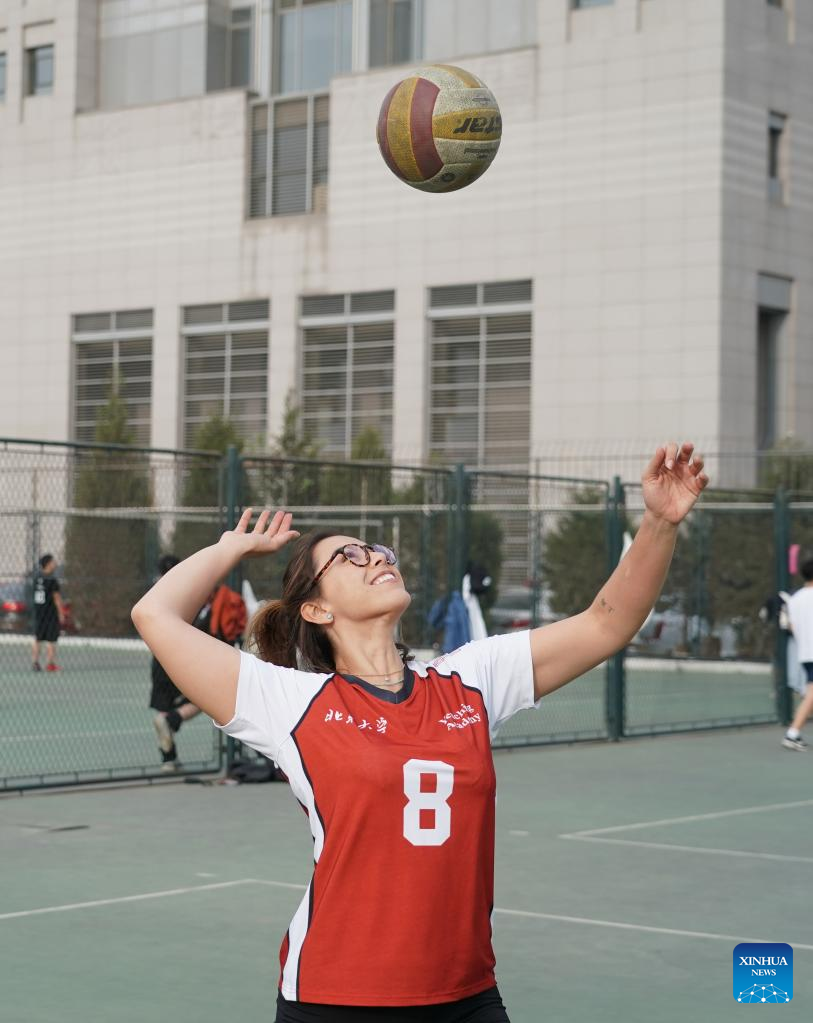
Manuela practices volleyball at Peking University in Beijing, capital of China, March 31, 2023.
Maria Eduarda Variani, Rafaela Viana dos Santos, Manuela Boiteux Pestana, and Marco Andre Rocha Germano are Brazilian students studying in the Master of China Studies program at the Yenching Academy of Peking University in China.
The four of them have been interested in Chinese culture since they were young. After arriving in Beijing, they have been impressed by the Chinese capital’s profound cultural heritage, convenient public services, and fabulous cityscape.
While making Chinese friends and learning about Chinese culture, they also participate in intercultural exchanges with other international students.
“Studying at Peking University gives me the chance to have a deeper understanding of Chinese history, tradition, and living customs,” said Manuela.
In the view of the four Brazilian students, China and Brazil have much in common. For example, both are major developing countries rich in natural resources and cultural heritage.
Additionally, both countries attach great importance to education, culture, and economic development. According to them, they all want to make contributions to the development of China-Brazil relations after they graduate. (Xinhua/Ren Chao)
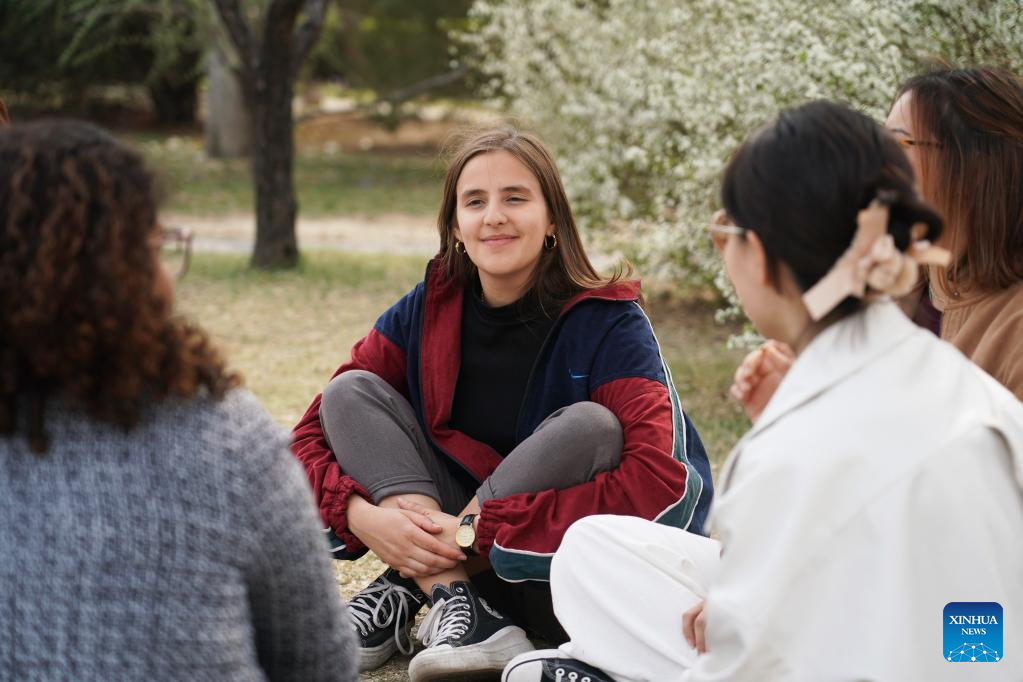
Maria (2nd L) chats with schoolmates at Peking University in Beijing, capital of China, March 31, 2023.
Maria Eduarda Variani, Rafaela Viana dos Santos, Manuela Boiteux Pestana, and Marco Andre Rocha Germano are Brazilian students studying in the Master of China Studies program at the Yenching Academy of Peking University in China.
The four of them have been interested in Chinese culture since they were young. After arriving in Beijing, they have been impressed by the Chinese capital’s profound cultural heritage, convenient public services, and fabulous cityscape.
While making Chinese friends and learning about Chinese culture, they also participate in intercultural exchanges with other international students.
“Studying at Peking University gives me the chance to have a deeper understanding of Chinese history, tradition, and living customs,” said Manuela.
In the view of the four Brazilian students, China and Brazil have much in common. For example, both are major developing countries rich in natural resources and cultural heritage.
Additionally, both countries attach great importance to education, culture, and economic development. According to them, they all want to make contributions to the development of China-Brazil relations after they graduate. (Xinhua/Ren Chao)
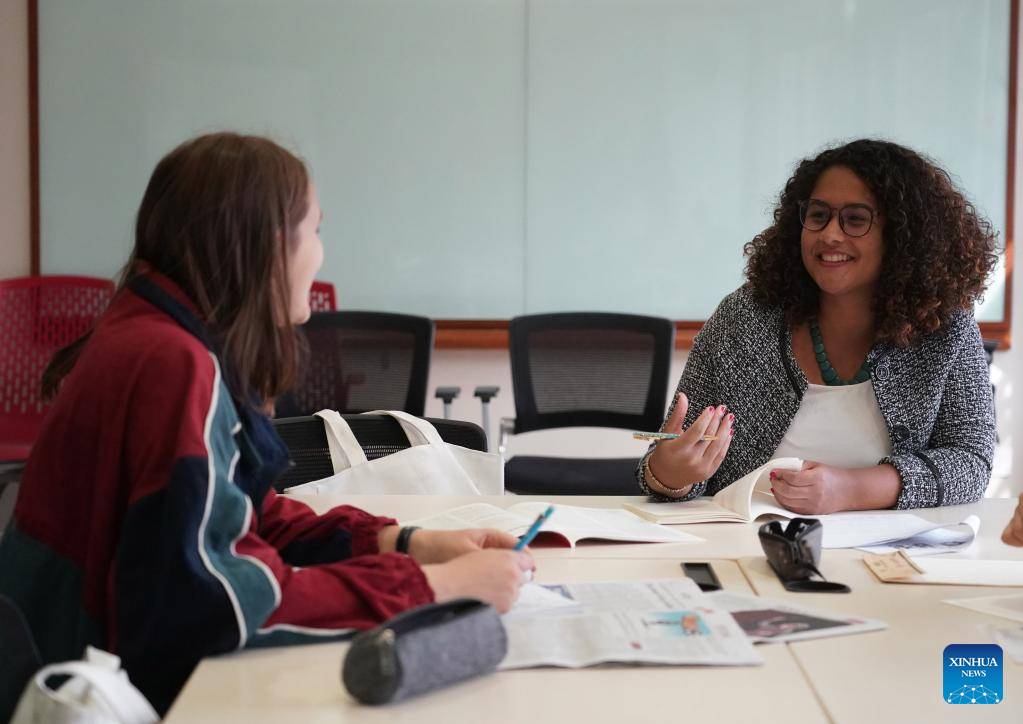
Rafaela (R) and Maria talk at a classroom at the Yenching Academy of Peking University in Beijing, capital of China, March 31, 2023.
Maria Eduarda Variani, Rafaela Viana dos Santos, Manuela Boiteux Pestana, and Marco Andre Rocha Germano are Brazilian students studying in the Master of China Studies program at the Yenching Academy of Peking University in China.
The four of them have been interested in Chinese culture since they were young. After arriving in Beijing, they have been impressed by the Chinese capital’s profound cultural heritage, convenient public services, and fabulous cityscape.
While making Chinese friends and learning about Chinese culture, they also participate in intercultural exchanges with other international students.
“Studying at Peking University gives me the chance to have a deeper understanding of Chinese history, tradition, and living customs,” said Manuela.
In the view of the four Brazilian students, China and Brazil have much in common. For example, both are major developing countries rich in natural resources and cultural heritage.
Additionally, both countries attach great importance to education, culture, and economic development. According to them, they all want to make contributions to the development of China-Brazil relations after they graduate. (Xinhua/Ren Chao)
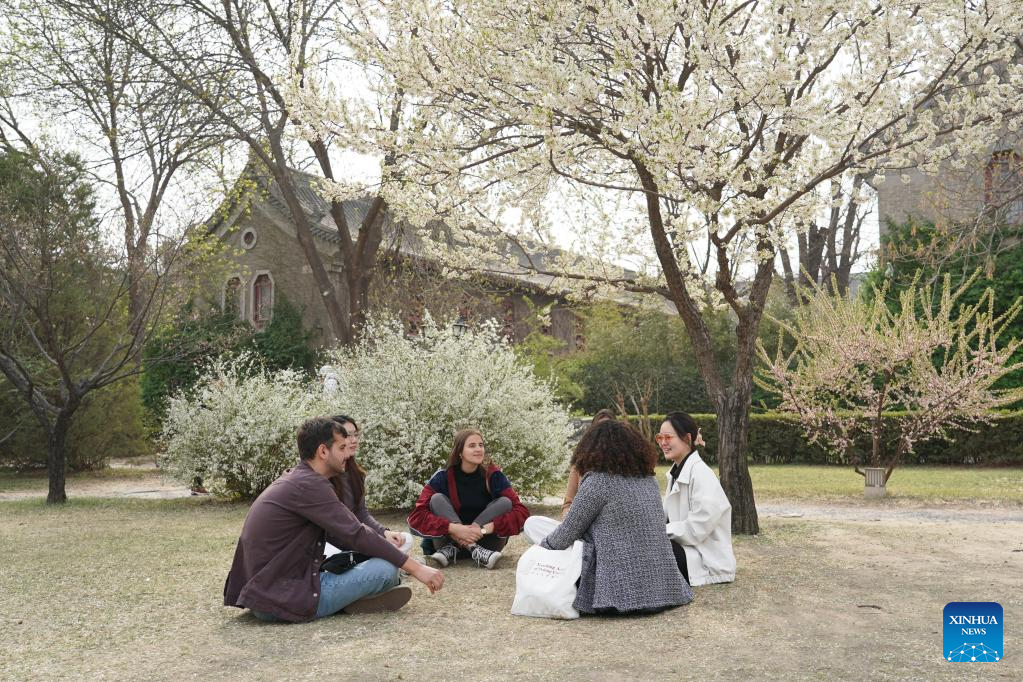
Marco (1st L) chats with schoolmates at Peking University in Beijing, capital of China, March 31, 2023.
Maria Eduarda Variani, Rafaela Viana dos Santos, Manuela Boiteux Pestana, and Marco Andre Rocha Germano are Brazilian students studying in the Master of China Studies program at the Yenching Academy of Peking University in China.
The four of them have been interested in Chinese culture since they were young. After arriving in Beijing, they have been impressed by the Chinese capital’s profound cultural heritage, convenient public services, and fabulous cityscape.
While making Chinese friends and learning about Chinese culture, they also participate in intercultural exchanges with other international students.
“Studying at Peking University gives me the chance to have a deeper understanding of Chinese history, tradition, and living customs,” said Manuela.
In the view of the four Brazilian students, China and Brazil have much in common. For example, both are major developing countries rich in natural resources and cultural heritage.
Additionally, both countries attach great importance to education, culture, and economic development. According to them, they all want to make contributions to the development of China-Brazil relations after they graduate. (Xinhua/Ren Chao)
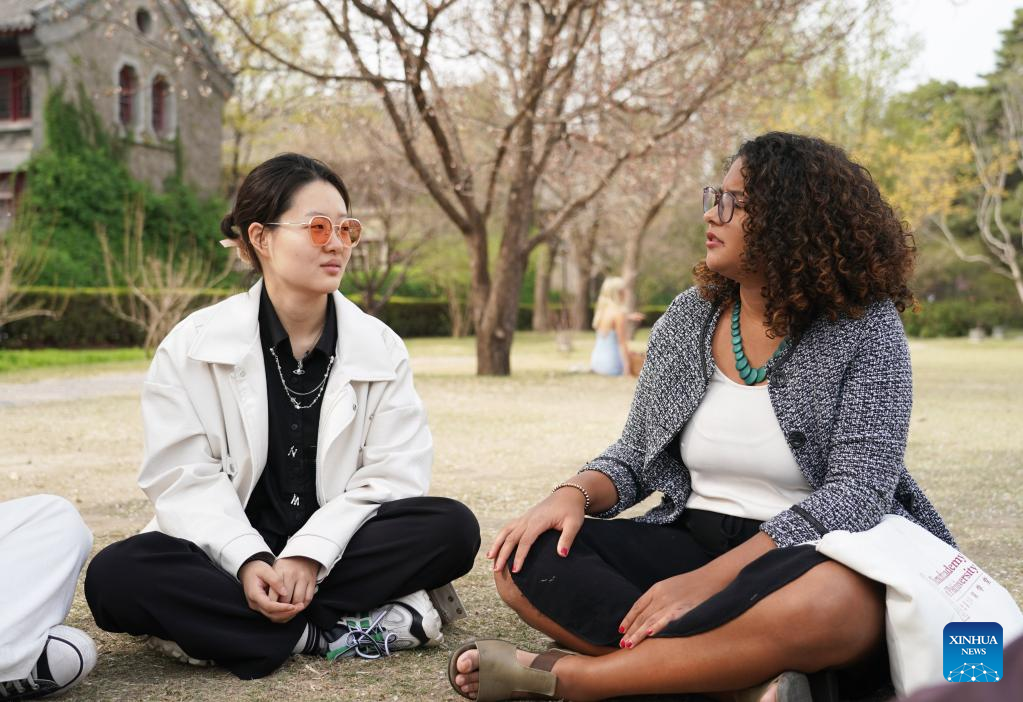
Rafaela (R) chats with a schoolmate at Peking University in Beijing, capital of China, March 31, 2023.
Maria Eduarda Variani, Rafaela Viana dos Santos, Manuela Boiteux Pestana, and Marco Andre Rocha Germano are Brazilian students studying in the Master of China Studies program at the Yenching Academy of Peking University in China.
The four of them have been interested in Chinese culture since they were young. After arriving in Beijing, they have been impressed by the Chinese capital’s profound cultural heritage, convenient public services, and fabulous cityscape.
While making Chinese friends and learning about Chinese culture, they also participate in intercultural exchanges with other international students.
“Studying at Peking University gives me the chance to have a deeper understanding of Chinese history, tradition, and living customs,” said Manuela.
In the view of the four Brazilian students, China and Brazil have much in common. For example, both are major developing countries rich in natural resources and cultural heritage.
Additionally, both countries attach great importance to education, culture, and economic development. According to them, they all want to make contributions to the development of China-Brazil relations after they graduate. (Xinhua/Ren Chao)
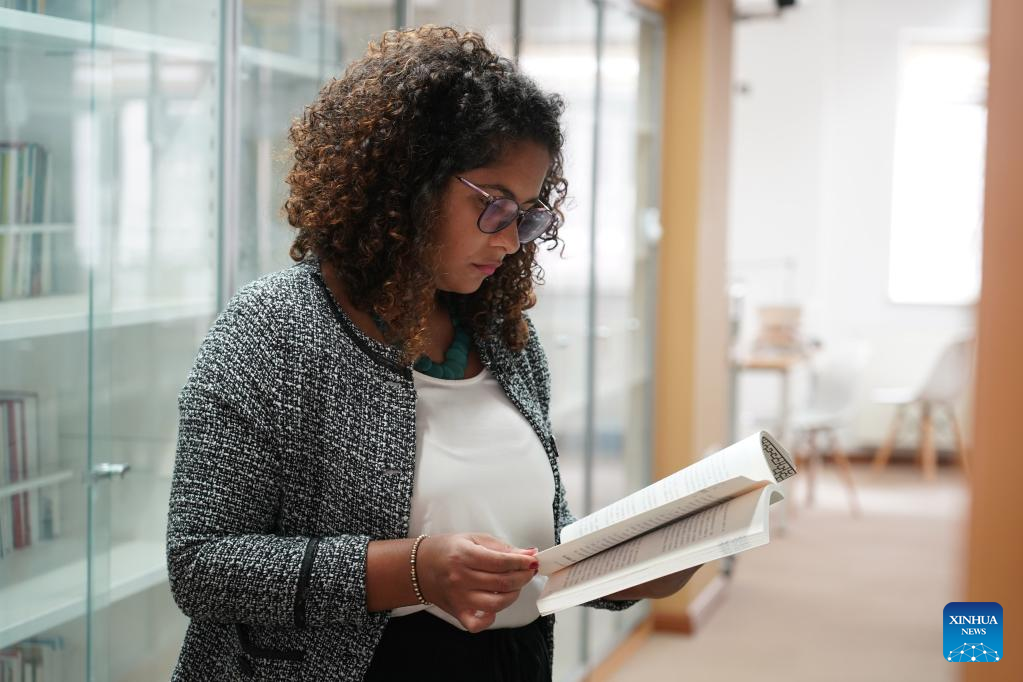
Rafaela (R) reads a book at a library of Peking University in Beijing, capital of China, March 31, 2023.
Maria Eduarda Variani, Rafaela Viana dos Santos, Manuela Boiteux Pestana, and Marco Andre Rocha Germano are Brazilian students studying in the Master of China Studies program at the Yenching Academy of Peking University in China.
The four of them have been interested in Chinese culture since they were young. After arriving in Beijing, they have been impressed by the Chinese capital’s profound cultural heritage, convenient public services, and fabulous cityscape.
While making Chinese friends and learning about Chinese culture, they also participate in intercultural exchanges with other international students.
“Studying at Peking University gives me the chance to have a deeper understanding of Chinese history, tradition, and living customs,” said Manuela.
In the view of the four Brazilian students, China and Brazil have much in common. For example, both are major developing countries rich in natural resources and cultural heritage.
Additionally, both countries attach great importance to education, culture, and economic development. According to them, they all want to make contributions to the development of China-Brazil relations after they graduate. (Xinhua/Ren Chao)
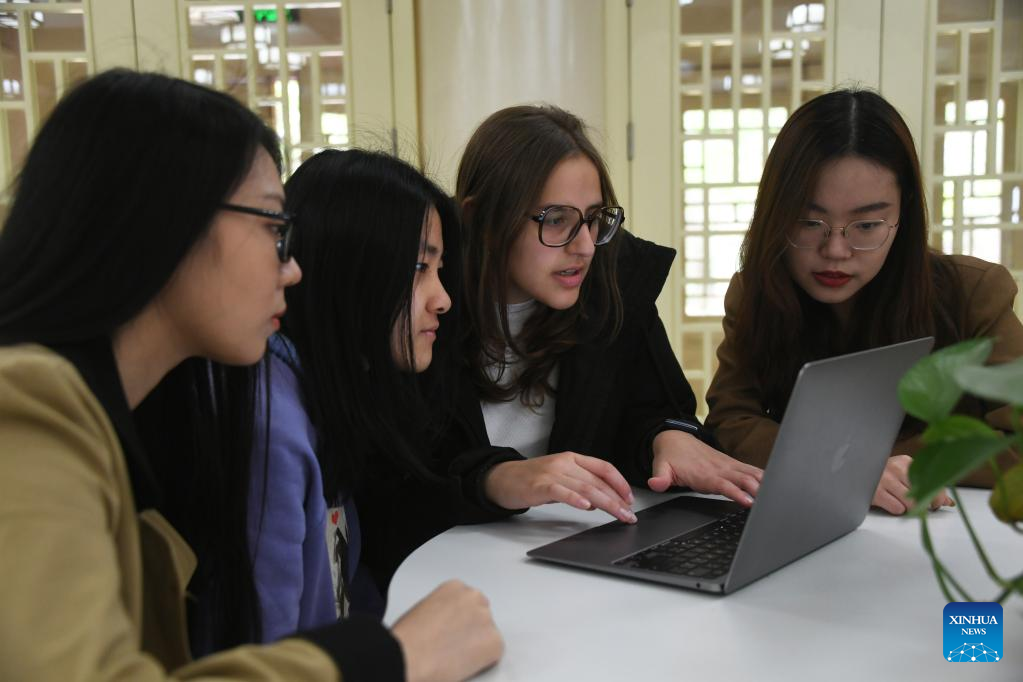
Maria (2nd R) talks with schoolmates at the Yenching Academy of Peking University in Beijing, capital of China, April 13, 2023.
Maria Eduarda Variani, Rafaela Viana dos Santos, Manuela Boiteux Pestana, and Marco Andre Rocha Germano are Brazilian students studying in the Master of China Studies program at the Yenching Academy of Peking University in China.
The four of them have been interested in Chinese culture since they were young. After arriving in Beijing, they have been impressed by the Chinese capital’s profound cultural heritage, convenient public services, and fabulous cityscape.
While making Chinese friends and learning about Chinese culture, they also participate in intercultural exchanges with other international students.
“Studying at Peking University gives me the chance to have a deeper understanding of Chinese history, tradition, and living customs,” said Manuela.
In the view of the four Brazilian students, China and Brazil have much in common. For example, both are major developing countries rich in natural resources and cultural heritage.
Additionally, both countries attach great importance to education, culture, and economic development. According to them, they all want to make contributions to the development of China-Brazil relations after they graduate. (Xinhua/Liu Lingyi)
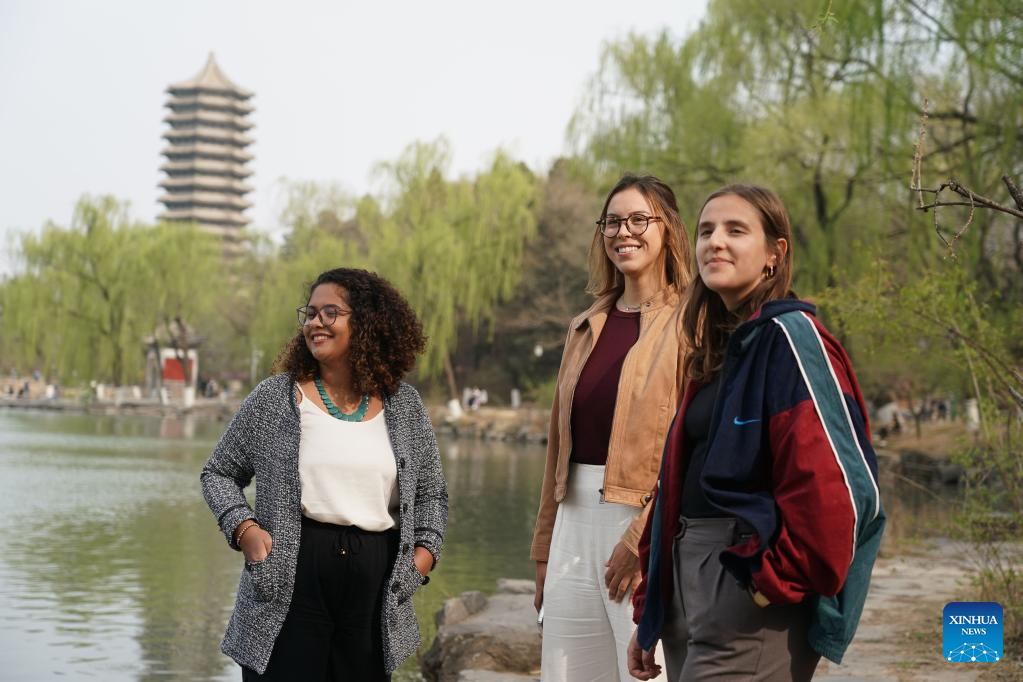
Rafaela (L), Manuela (C) and Maria pose for a photo near the Weiming Lake of Peking University in Beijing, capital of China, March 31, 2023.
Maria Eduarda Variani, Rafaela Viana dos Santos, Manuela Boiteux Pestana, and Marco Andre Rocha Germano are Brazilian students studying in the Master of China Studies program at the Yenching Academy of Peking University in China.
The four of them have been interested in Chinese culture since they were young. After arriving in Beijing, they have been impressed by the Chinese capital’s profound cultural heritage, convenient public services, and fabulous cityscape.
While making Chinese friends and learning about Chinese culture, they also participate in intercultural exchanges with other international students.
“Studying at Peking University gives me the chance to have a deeper understanding of Chinese history, tradition, and living customs,” said Manuela.
In the view of the four Brazilian students, China and Brazil have much in common. For example, both are major developing countries rich in natural resources and cultural heritage.
Additionally, both countries attach great importance to education, culture, and economic development. According to them, they all want to make contributions to the development of China-Brazil relations after they graduate.
Source : Xinhua






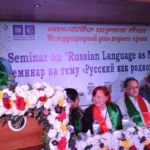


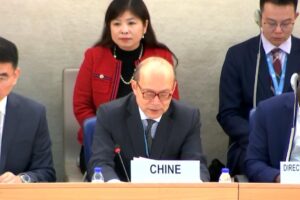






Add Comment